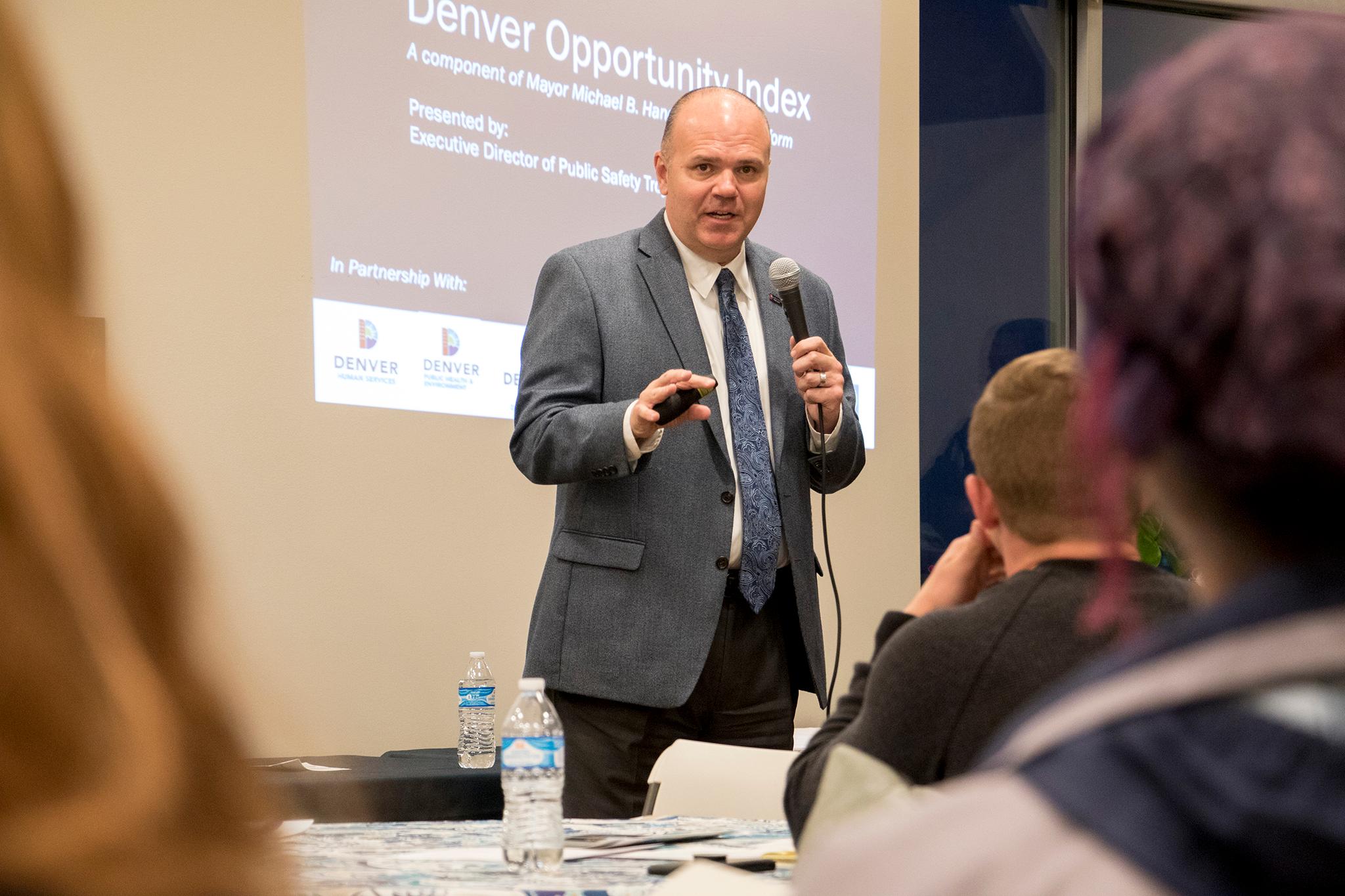Less than two years after taking the top job to lead Denver's Department of Public Safety, Troy Riggs will leave at the end of January for a job in the private sector. It will be his ninth job change in 10 years since he left the Louisville Police Department in 2009. Riggs has said he will become a vice president of a private firm, but has not disclosed the company's name or location.
Since Colorado Politics broke the story of Riggs' departure, he has said that creating Denver's "Opportunity Index" was the best product of his tenure. Riggs and his boss, Mayor Michael Hancock, have boasted about the index, which compiles data on social factors like poverty and health access with crime statistics. It's an effort meant to inform policing that Riggs has described as a "philosophical shift" in policing that "treats the root causes of crime."
According to Mike Strott, a spokesman for the mayor's office, Riggs' efforts with the index will continue after he resigns, but what that means remains unclear.
What is the opportunity index?
The official definition for the government's initiative can be found here. It's a map, broken down into the 142 census tracts, with three "pillars" that rank each tract based on data that represents a specific social factor.
The pillars include financial security -- which is determined by the poverty rate, income and property crimes in the area, behavioral health -- determined by the percentage of people with physical and mental disabilities, access to healthcare and the violent crime rate, and "people left behind" -- which looks at educational attainment, access to transportation and neighborhood amenities.
"We have data for every block," Riggs said in an interview in November. "This really is the future of public safety. "
The goal is to reveal problems that may underpin crime in some areas and find ways to deal with those social problems.
"We see the issues they are dealing with and we overlay crime statistics," Riggs said. "That's where we want to start putting our services to address those quality-of-life issues. Over the long term we think we can address those issues."
While this data has never been laid out in this specific format, none of it is new, and anyone familiar with Denver's demographics will immediately spot the "inverted L" shape that very consistently illustrates the city's geographic disparities.
Using data for policing is also not new. These programs are often described as "data-driven" or "intelligence-led" policing. Almost every major police department in the country has some iteration of these types of programs.
Denver doesn't have the best record when it comes to this kind of policing. In 2017, the city auditor found that the Denver Police Department failed to follow some basic guidelines within a commonly used data program. Then-Police Chief David Quinones rejected all of the city auditor's suggestions.
Riggs claims Denver's program is different and more comprehensive than any other department in the country. In a tense exchange at an October city council meeting where Riggs presented the index's first-year results, Councilwoman Candi CdeBaca pressed Riggs for data on how the program was different and said she didn't see anything novel in the approach.
"Well, I disagree," he said in the meeting.
This approach to policing seems to be about changing how people think. Nothing indicates the program, in its infancy, has lowered crime and punishment rates.
For Riggs and other supporters of the opportunity index, it marks a change in how public safety and crime are traditionally thought about by public servants.
"All my life as a kid growing up through the present day policing has been about arresting people and putting them in jail," said Councilman Paul Kashmann, who has vocally supported the index. "We know there are a lot of people that end up in jail that shouldn't be there and the idea here is to get people the help they need instead of putting them in jail."
Under Riggs, the public safety department did make significant changes in that direction. Riggs eliminated booking fees in city jails as well as fees for electronic monitoring. He said that the fees put an undue burden on offenders who were struggling financially. Under his leadership, the department also started a program in which police carried packages of food and gave them to struggling families they encountered on the job. Denver police launched a special unit last year that teams police with licensed mental health counselors and last month released a map to help police quickly locate social services for people in need.
One direct result of the data compilation was ballot initiative 2C in November, which added emergency medical technicians to the city's force. The fire department proposed the initiative after data showed that the vast majority of calls to the fire department in one small area of the downtown core were medical -- not fire-related.
The passage of the initiative created a dedicated medical unit for the area, eliminating the need for an expensive fire truck with a full four-person staff for every call. The streamlining saved the city money and allowed the med unit to have one additional shift. Since the change, the volume of calls the med units take has increased 90 percent while their hours have only increased 51 percent, according to Kelli Christensen, spokeswoman for the department.
While those programs are widely considered successful, some are skeptical of the index and whether or not the department has really changed.
During the October council meeting, Riggs faced some criticism from several members who were concerned that the index would result in increased policing in neighborhoods of color. Riggs has denied that this is the case. CdeBaca, in an interview after the meeting, said she didn't think the data alone would really make a change. She wants to see money taken from policing and put into resolving the social issues identified in the index.
"It could be revolutionary if they were actually designing the entire approach to safety around the opportunity index," she said. "If we were shifting a substantial amount of the money from public safety to addressing these problems, it would be different, but the biggest budget in the city is the department of safety and we've identified through the opportunity index that the root of crime is economic inequality and racial and social injustice and we have done nothing to address that."
Denverite reached out to justice reform advocates and police watchdogs around the city, but not one of them had anything to say on the record about the opportunity index's success or failure. Some had never heard of it, others said they liked the idea but had not seen any significant changes to the police department.
Despite his attempts to give enforcement a more empathetic face, Riggs said that addressing those social problems won't come from the public safety budget, which is $583 million. It will be up to non-government groups and outside partnerships to actually make the changes, he said.
"We need non-profits and faith-based organizations to really put us where we need to be as a community," Riggs said.
So... what happens next?
According to Riggs, much of the implementation and long-term planning for the index was slated to begin in 2020. Riggs said the department will hire more people to work with data and launching a "data center" this year. There's already been at least one hire. After former Sheriff Patrick Firman stepped down in October, he was handed another job by the mayor as a data analyst.
When asked when the index will start to show an effect on crime stats, Riggs emphasized that the change will be slow. He said it is less about reducing crime and more about reframing the way the officials in the department think about public safety.
"When we say philosophical shifts you don't do that in six months or a year," Riggs said.













